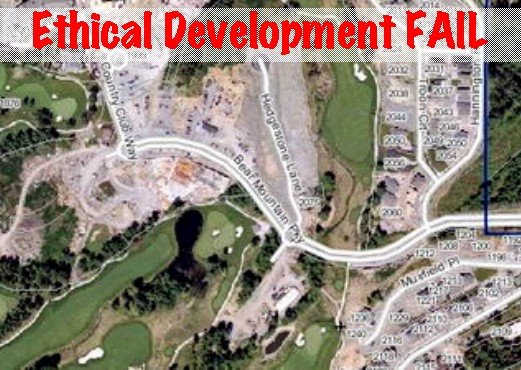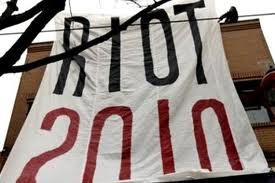
March 14, 2009
Oh, how the mighty have fallen – and they haven’t hit bottom yet.
Looks like some prominent Vancouver Island developers can’t afford to pay for their massive condo projects. Langford Mayor Stew Young’s statement at the last public hearing turns out to be true — he’s lining up to demand a taxpayer bailout for the Bear Mountain Resort developers.
It takes a special kind of hypocrisy to brag (loudly and constantly) that the new highway interchange will be 100% paid for by developers, and then turn around and beg for a federal grant. Of course, the grant would have to be matched by municipal revenue, meaning taxpayers get soaked twice.
That would be enough for most public officials, but here Langford ups the ante and demands millions more for a parkway to service the posh but half-empty golf resort. That takes real gall.
I’m really offended that politicians want to give taxpayer money to rich developers, especially when they’re destroying rare ecosystems and demolishing native burial cairns and blasting sacred caves.
Bad karma, much?
Langford wants to bill taxpayers $21-million for its “100% developer-funded” projects.
On Monday, March 16, the city of Langford will apply for a federal and provincial bailout for construction on the Spencer Road Interchange and Bear Mountain Parkway. The application was approved by City Council in a special meeting March 12. On March 13, city engineer John Manson confirmed the city is applying for $21.5-million in infrastructure grant money for the interchange and road project. An additional $3-million would come from city revenues.
According to Manson, the city asserts that the interchange on-ramps are not part of the interchange agreement, and that the Bear Mountain Parkway – which lies completely within a Local Service Area on South Skirt Mountain – is not, in fact, part of that Local Service Area. The parkway connects the Spencer Interchange to Bear Mountain Resort.
The Community Charter defines a Local Area Service (LAS) as a municipal service that is to be paid for in whole or in part by a local service tax. In this case, council considers an LAS to be a service to provide particular benefit to a part of the municipality. It’s like a user-pay system – if a developer wants a highway interchange next to his property so he can build thousands of condos, he can pay for that construction himself and everyone’s happy, right?
Right, but in this case, the city borrowed $10 million on behalf of the developers, provoking cries of favouritism. Now everyone’s wondering what will happen if the developers default on the repayment.
Anyway, it may be true that the fine print on the interchange deal left out the two ramps in the southwest quadrant near Langford Lake Cave.
However, the parkway is an integral part of the Local Service area. A staff report notes:
“The subject propertles are located within a Local Service Area for road construction. Therefore, the owners will be paying for road construction instead of paying road DCCs [development cost charges – a tax on development]. Due to this, they are not also eligible for Road DCC amounts. The total amount contributed to the Local Service Area road construction is: $28,322,882. “
On December 27, 2007, Langford Council gave first, second and third reading to Bylaw 1147, which defined the Spencer Road Interchange (formerly known as the Bear Mountain Interchange), as a Local Area Service, and set out the boundaries of a Local Service Area (LSA) to fund the interchange. The Local Area Service bylaw was later adopted as Bylaw 1156 on April 7, 2008.
“Langford North Connector Road” was known, until now, as “Bear Mountain Parkway” and it is entirely within the LSA defined by Bylaw 1156. This bylaw is still in force and has not been rescinded. The road is to be funded by a proposed new development called “South Skirt Mountain Village,” which is also entirely within the LSA. Langford Council gave first reading to a bylaw for zoning for the project on February 23.
The zoning process for the South Skirt development is plagued by procedural problems, including non-disclosure of documents and improper conduct at public hearings. If the South Skirt Mountain re-zoning bylaw is adopted based on the current process, we’ve advised the City of Langford that it’s susceptible to a legal challenge under the Judicial Review Procedure Act.
Fewer than 400 people live in the area to be served by the interchange and the parkway.
LGB9 Corporation, owner of Bear Mountain Resort, holds title to over half of the land in the Skirt Mountain Local Service Area and has committed to 55% of the total LSA fees.
Section 25(1) of the Community Charter expressly forbids a municipality from providing “a grant, benefit, advantage or other form of assistance to a business” except for a few exceptions, none of which apply here.
This will all blow up at the public hearing Monday, March 16. Stay tuned for the next exciting chapter, in which our heroes annihilate the rezoning bylaw.


 Deirdre Campbell
Deirdre Campbell







